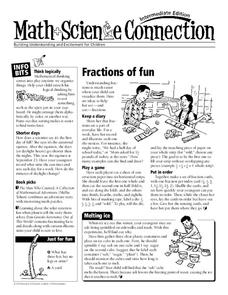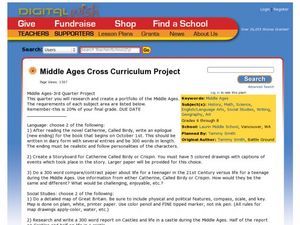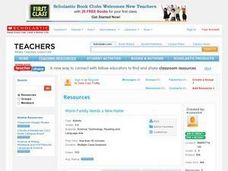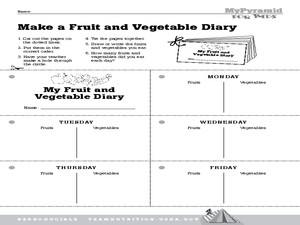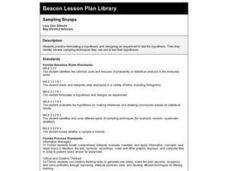Resources for Educators
Fractions of Fun
Reinforce concepts and encourage learner engagement with a collection of math games, science experiments, and cross curricular activities. In one fun resource, learners sort objects, keep a diary of everyday fractions, play a game using...
Curated OER
World Animal Day
In this World Animal Day activity, students complete activities such as reading a passage, phrase matching, fill in the blanks, correct words, multiple choice, spelling, sequencing, scrambled sentences, writing questions, survey, and...
Curated OER
Life in a Hurricane Zone
Students investigate the social effects of hurricanes. In this social studies lesson, students assume the persona of residents of the Dominican Republic and write diary entries and letters regarding the devastation caused by Hurricane...
Curated OER
To a Place Like No Other (Galapagos Islands)
Students research and collect information on the Galapagos Islands. In this Galapagos Islands lesson, students find information for a jeopardy game, a first person account and a geological discovery related to the Galapagos Islands.
Curated OER
Life in a Hurricane Zone
Students research the effects of living in a hurricane zone. In this hurricane zone lesson, students research the impact of natural disasters on humans and the environment, and write a press release describing the devastation of...
Curated OER
Middle Ages Cross Curriculum Project
Middle schoolers complete several projects on the Middle Ages. In this world history lesson, students complete language arts, social studies, math, and science projects. Some of these include: comparing a teenager's life now to that in...
Curated OER
Robert Boyle's Informants
Students review and discuss the importance of Boyle's informants and how he sometimes relied on information from those with experience of the wider world to substantiate his scientific theories. They complete the worksheet, answering...
Curated OER
Life in the Freezer
For this global warming worksheet, climatologists examine a few possible results of climate change. There is no specific reading from which learners extrapolate the information needed to answer the questions, so you will need to preface...
Curated OER
Food Choices The Pyramid Way
Young scholars develop skills in making nutritionally-sound food choices. Keeping a food diary, they analyze their food intake using the food pyramid as a guide. Students identify and explain the relationship of nutrition to personal...
Curated OER
Garden In a Glove
Students investigate the concept of seeds and how they can germinate. They obtain seeds and isolate them in a rubber glove before transplanting them into the ground. The lesson plan includes a graphic organizer for observations or...
Curated OER
The Making of a Star
Students create schematic diagrams of the new Russian space station module. They compose an imaginary yet realistic series of diary entries from the point of view of an astronaut living on board the completed space station.
National Park Service
The Young Naturalist
Beginning with a brief history of our 26th president, Theodore Roosevelt, then followed by a discussion of his interest in nature, young scientists take to the outdoors to locate and observe local plants and insects....
Curated OER
Worm Family Needs A New Home
Students examine different types of soil. For this soil lesson, students research different types of soil. Students create a podcast about a worm family looking for a new home using storyboarding or graphic organizers.
Curated OER
Exploiting Antarctica
Students read the story and diary "Lizzie's diaries from Antarctica and Antarctica" to get massive clean-up. Students discuss their knowledge of life in Antarctica and raise the fact of the Amundsen-Scott South Pole Station and its...
Curated OER
Paleontologist: Can You Dig It?
Students investigate what a paleontologist does. They participate in a dinosaur dig, write a story, and explore the Dinosaur Dig website to view and discuss photos of a real dinosaur dig.
Curated OER
Archaeology and History
For this archaeology worksheet, students draw the given chart into a folder and copy the given points. Students then write the missing word 'historians' or 'archaeologist' for the sentences. Students visit an interactive timeline website...
Curated OER
Development of Industrial New Hampshire
Students work in groups to research and share information about several different topics that were part of the development of Industrial New Hampshire. Students complete five parts of the project which include researching, role playing...
Curated OER
Aquarium Journals
Fifth graders keep journals of observations made about their Aquademics aquarium. Using a worksheet, they record information such as tank water temperature, feeding times, ammonia and pH levels, and unusual behaviors. Journals can be...
Curated OER
Five a Day
Students look up and print definitions of fruit and vegatable. They write down their food intake for three days. They identify and categorize fruits and vegetables. They research how fruits and vegetables grow. They bring in their...
Curated OER
Lunar Cycles
Eighth graders conduct internet research on a specific website to collect information about Lunar Cycles.
Curated OER
Flightless Birds and Scientific Research
Students study the work done by various scientists on Antarctica. In this biology instructional activity, students play the role of researchers who must justify the importance of their study. They create a multimedia presentation about a...
Curated OER
Cloud in the Classroom
Students describe the relationship between animals and humans. In this biology instructional activity, students research about the history of horses in America. They present a mock news broadcast about their research.
Curated OER
Lesson 3: Vary Your Veggies and Focus on Fruits
Students explore fruits and vegetables. In this nutrition instructional activity, students generate a list of all known fruits and vegetables. Students cut out and compile pages for a weekly fruits and vegetable...
Curated OER
Sampling Snoops
Students practice formulating a hypothesis and designing an experiment to test the hypothesis. They identify several sampling techniques they can use to test their hypotheses.
